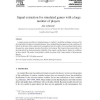Free Online Productivity Tools
i2Speak
i2Symbol
i2OCR
iTex2Img
iWeb2Print
iWeb2Shot
i2Type
iPdf2Split
iPdf2Merge
i2Bopomofo
i2Arabic
i2Style
i2Image
i2PDF
iLatex2Rtf
Sci2ools
99
Voted
CSDA
2006
2006
Signal extraction for simulated games with a large number of players
A signal extraction problem in simulated games is studied. A modelling technique is proposed for deriving beliefs for players in simulated games. Since standard Bayesian games provide conditions for beliefs on the basis of the common prior assumption, they do not allow for non-uniform beliefs unless the game has some dynamic structure that allows for learning. The framework presented allows for deriving beliefs by characterizing the reliability of the signals, and the players' degree of confidence in these signals. This makes it particularly suitable for games with a large number of heterogenous players.
Related Content
| Added | 11 Dec 2010 |
| Updated | 11 Dec 2010 |
| Type | Journal |
| Year | 2006 |
| Where | CSDA |
| Authors | Aki Lehtinen |
Comments (0)

